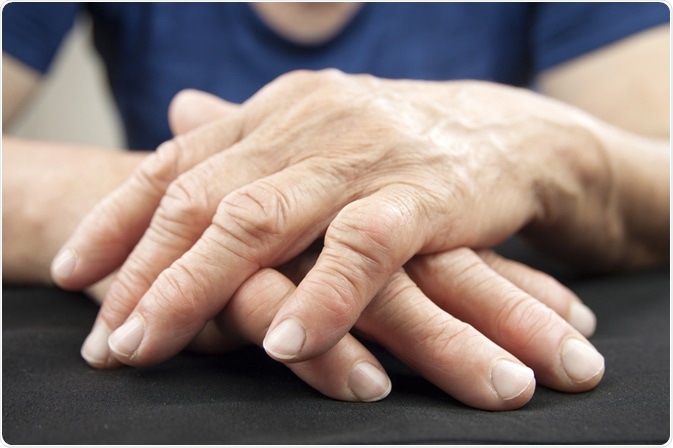For patients living with rheumatoid arthritis, there are several daily living tips and techniques that can help to reduce symptoms and improve the overall quality of life.

Image Credit: Hriana / Shutterstock.com
Physical activity and rest
Gentle exercise is a core component of the treatment plan for rheumatoid arthritis because significant benefits are evident. Low-impact aerobic activity, as well as muscle strengthening and flexibility exercises, are thought to be most beneficial. Ideal activities include:
- Walking
- Swimming
- Water aerobics
However, it is important that this activity is balanced by periods of rest, particularly when the disease is active and the painful, swollen, or stiff joints pose a significant problem.
Hot and cold therapies
Both hot and cold therapies can be useful in the long-term management and self-care of rheumatoid arthritis.
Heat pads or warm baths are considered to be the most beneficial in soothiong stiff joints and muscles, whereas cold packs are ideal for relieving acute pain and inflammation.
Relaxation techniques
Several different relaxation techniques can also be helpful in coping with the pain of rheumatoid arthritis and reduce the affected individual's stress in life. These techniques may include:
- Deep breathing
- Guided imagery
- Visualization
- Distraction
- Muscle relaxation
- Massage
Rheumatoid Arthritis Flares: Tips on Self-managing a RA Flare | Johns Hopkins Medicine
Diet
Although there is no specific diet for patients with rheumatoid arthritis, there are certain foods that may help to relieve or worsen symptoms.
For example, foods rich in antioxidants can help to control and reduce related inflammation. The Mediterranean diet has been linked to better outcomes regarding the disease, which is high in antioxidants and vitamins A, C, and E.
Individuals with rheumatoid arthritis are likely to benefit from eating more fresh fruits and vegetables, which are high in antioxidants and vitamin content while also avoiding processed foods. Dairy products and acidic foods, including citrus fruits, may also aggravate symptoms.
Pharmacotherapy
Most patients with rheumatoid arthritis will have a medication plan from their doctor, which they should follow as prescribed for the best results.
Additionally, topical treatments can be applied directly to the painful area to relieve acute symptoms. Depending on the case, topical treatments containing non-steroidal anti-inflammatory drugs (NSAIDs), salicylates or capsaicin may all offer a benefit.
There are also some supplements that have been linked to an improvement in symptoms, particularly joint pain and morning stiffness. Turmeric and omega-3 fish oil supplements may both be indicated; however, this should be included in the overall treatment plan discussed between the doctor and patient.
Support
It is important for affected individuals to have a strong support network of family and friends who will help them throughout the changes that occur in rheumatoid arthritis.
People with rheumatoid arthritis are more likely to be affected by depression, anxiety, and have low self-esteem. Many patients may find that discussing their struggles and issues with someone else, such as a family member, friend, or health professional, can help to lift the weight off of their shoulders.
Other self-help tips
Some additional tips for people living with rheumatoid arthritis include:
- Take control of treatment and action plan
- Recognize limits and take a rest when tired
- Socialize and connect with other people
- Spend time enjoying some activities by yourself
Finally, if any significant changes in symptoms or other characteristics of the condition are observed, it is best for the patient to seek help from a medical professional who can provide relevant advice.
References
Further Reading
Last Updated: Mar 17, 2023